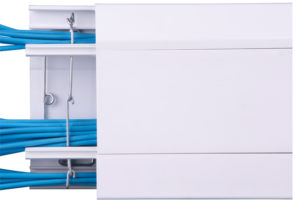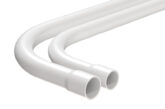
Here, Nick Hayler, Technical and Product QA Manager at Marshall-Tufflex explains how the changes to the 18th Edition IET Wiring Regulations can save lives.
In the event of a fire, safe and quick evacuation for building occupants is crucial. However, during this critical time, building structures can become unpredictable as components warp and melt under the growing heat, posing risk and danger to those inside.
For example, cables housed in management systems overhead can become a significant problem, as the heat can destroy the cable housing – causing the cables to collapse and block escape routes; not only hindering escape, but also preventing fire services from safely entering and exiting the building swiftly.
Changing times
For a time, installers were only required to support wiring against premature collapse along pre-determined fire escape routes. However, following a number of injuries and a firefighter’s tragic death, the regulations have changed.
As part of the changes to BS 7671 IET Wiring Regulations, Regulation 521.10.201, has now been replaced by Regulation 521.10.202, which stipulates that cables must be supported throughout the entire building. Furthermore, all products must also satisfy the requirements of the Construction Products Regulations (CPR) in relation to their reaction to fire.
These changes mean that the sole use of non-metallic cable clips to secure cabling is no longer acceptable in installations; as an example, metal clips will now need to be installed. In addition, metallic clips must be used on metal units, even when supported on metal cable trays or ladder racks. Cables not housed within these structures will need to be securely attached to the structure of the building using fixings that will not be destroyed by fire.
Cable clarity
Whilst this may seem clear, some aspects of the new regulations remain vague in parts. For example, there is still no product standard to identify appropriate fixings that comply with the Wiring Regulations. Furthermore, some fixings that meet the new regulations may, conversely, be unsuitable for fixing fire-resistant cables for fire alarms, voice evacuation systems and emergency communication systems. Similarly, the British Electrotechnical and Allied Manufacturers Association (BEAMA) has requested a definition for the term ‘premature collapse’, which is used throughout the new regulations but has never been defined.
Marshall solution
An example of such a product range is the Firefly Fire Clips range from Marshall-Tufflex, which meets all the necessary requirements.
The clips have been designed to prevent cabling from falling and are suitable for use within Marshall-Tufflex’s Conduit, Mini, Maxi, Mono, Twin165, Twin Plus, Sterling Profile, Sterling Curve and Odyssey trunking systems.
Across the range, each product has been designed to be fire resistant above 1000°C for up to 120 minutes. With ease-of-installation in mind, the solutions feature rounded ends to prevent damage to cables and injury to installers. For Mini trunking, there is also the option of an external version for a fast and simple retrofit. Additionally, there is a choice of clips or straps for use when installing 20 or 25mm conduit.
Updated regulations within the BS 7671 IET Wiring Regulations (18th Edition) have been designed to ensure buildings are safer for those inside. Whilst changes have been made to a number of areas, wholesalers should be aware of fire clips and cable management solutions, especially when it concerns life saving measures. In addition, being able to confidently provide your customers with knowledge about industry requirements will help deliver additional value and reassurance.

For more information on Marshall-Tufflex, please visit: https://www.marshall-tufflex.com/








